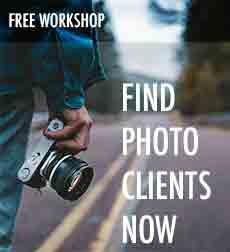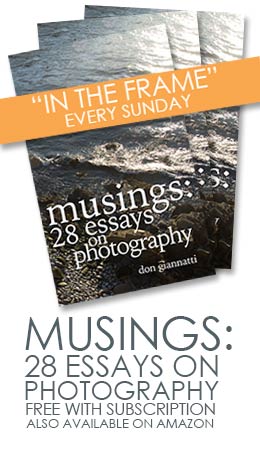Rant/Rave today.
So it kinda sounds like this to a lot of young photographers:
1. You can’t get gigs unless you have experience.
2. Without actual shoots you cannot get experience.
3. You must always charge for your work (see # 1 above)
4. Get an assistant gig.
5. There are few assistant gigs.
7. Never shoot for experience alone.
Start at the top… repeat.
That, folks, sounds like a politician trying to tell us that unemployment is a blessing because it increases employment.
Yeah – sure.
There is always a conundrum that plays on in this business, and it makes me crazy to see and hear such a deafening silence when someone actually asks HOW to get off that round-about.
On a private forum I belong to, one of the photographers, Paulo, asked me a set of questions about my post, “Sometimes It Is About Getting the Shot”. He is allowing me to share the questions and my answers with you.
“After all you come out of college with your photography degree, or leave your job with everything up until that point telling you that you are a great photographer but can you really be expected to hit a home run every time?”
Yes. By carefully picking your starting points, and making sure you have the assets in place to produce the work required. In other words… pick your challenges. Would a kid coming out of college have the experience to shoot a 6 day annual report over several countries? Probably not. Environmental portrait in the city… sure. I would at least hope so.
So the point is to begin to build to the point where doing the big stuff comes second nature. My friend Ken, who I referenced in the article, had a client here in Phoenix that had him shooting about 20 portraits a month. They paid $250 per and let him do his thing on the images… he built a great portfolio, and actually put a lot of money in his pocket. If it had been a one off, it would have been too low of a rate… but they guaranteed him at least 10 per month… so it was not a bad deal. I can tell you that the experience Ken got while doing that gig was priceless.
Want to shoot high end real estate? Do work for architects where a ‘re-shoot’ isn’t that big of a problem. There are usually not that many deadlines, and you can return the next day and shoot it again. If access is required, get access for a period of a few days to make sure you can get it. The ‘practice’ and experience should start to build in to your personal ‘apps’ if you will.
It is more about managing your learning, testing incessantly, and building your skills. And many times you spend a lot of your own capital doing so.
Put together a larger shot for a weekend morning – set a shoot time in your head. Three models, a MUA, a stylist. Set the call times and treat it as a professional gig. Of course make great images, but also make note of things like timing, and set control, and managing the shoot from the photographer’s position. We can learn how to go out and make a photograph when there is only a model and ourselves… and no time frame – and no distractions and the freedom to do what we want…
Things change real fast when there are more people in the mix, a time frame and the exponentially increasing challenges that brings. Did your shot come together in the time frame you expected? Or did hair and makeup take longer than expected, lighting take up too much time, or the people become unmanageable for directing into a tight shoot schedule?
If it came off great, wonderful. Do another shoot just like it to build that experience into your personal apps. If it didn’t, imagine how it would have gone if the call were sunset? The sun doesn’t set on your time… it sets on its time. So do it again, but then have the very real, scary deadline reveal itself slowly falling to the horizon.
“So what is the enabler? What turns your average photographer or even a gifted newbie into the kind of pro that you are talking about? Skills, talent , vision and common sense can get you off the starting blocks and for some very gifted people that may well be all they need to reach your standard but I think the vital missing ingredient is experience.”
Experience is the most important thing of all. We used to get it by assisting, and yeah, that is a lot harder to come by these days. But working for smaller companies and smaller agencies can lead one up. You must start “small” – if you will – and keep your abilities to do the gigs in the fore of what you are looking to do.
In some ways your portfolio will help you keep those expectations under control. In your book show the work you are prepared to do. Show the work you are proficient in. Don’t accept assignments you cannot do. If it is out of your league, be smart enough to pass on it. (Or be smart enough to hire the best damn assistants you can find who actually HAVE experience in doing that kind of shot. I did that on a few occasions. Paid the assistants handsomely, LEARNED a ton, put some money in my pocket and delivered exactly what the client wanted. But you better be dialed in to the best assistants in your area.)
In any case, be damned sure you can do what you are being asked to do. Does that mean we play it totally safe and never, ever put ourselves out there on a limb? ROFL… oh hell no… part of this amazing business is the excitement of possibly instant death (well, maybe a little over the top, but the adrenaline that gets pushed… whew!!!)
Let’s say you want to shoot for big time sports officials. Here in the states we have the NFL or whatever. It is nearly impossible to start with them… too big, too much power, and too many gatekeepers. The challenges would be formidable.
So start with the minor leagues. Want to do big setup shots? Do one. It may mean a little more arm twisting and some out of pocket… but arrange and create a bigass setup shot. Do the best damn little league shot ever made. Find some pickup basketball players and bring out all the bells and whistles to do a killer shot of them playing in the street courts. Gymnasts, Ice Skaters, Bodybuilders, and Dancers can all be approached for photography. Do it, do it, do it. Period.
Take the images and do what we used to call a “post mortem” on the shoot. What did you learn? How can you make it better next time?
As you build your book… keep pushing your work and your style to a place where you are so totally comfortable with it that you can create it when needed.
“How do you get experience?”
By doing it. I know that sounds a little snarky, but it is not meant to be. I would say that if someone wanted to shoot music, and couldn’t find anyone to photograph, or bands to work with, or managers willing to take a chance on a portfolio shoot – that person is going to have a terrible time in the ‘music photography’ business. If you cannot find a way to make this stuff happen, how will it be easier when you have a ton of restrictions, expectations and money on the line?
Create your shots, form a group that meets once a week to do a big shot. Assist and shoot. (I have an idea about how that should work… if you are the shooter, you shoot and others assist. Period. When it is your turn to shoot your gig, others assist… but no one shoots but that day’s designated shooter. Otherwise the images can be pretty worthless… Unless you totally change the shot from shooter to shooter. Having a couple of shooters with the same image in their books is just stupid.)
“The best way is on the job, but all the lessons learned can harm your career as your article illustrates. Working as an assistant will teach you how to solve problems by learning from someone who already has the experience or at worst learn from their mistakes without any cost to you.”
It is so important to understand that you don’t start at the top. Shooting an editorial is usually not as ‘gut wrenching’ as shooting for an ad agency. Shooting (testing) models for agencies is less dangerous than shooting editorial for local magazines. So you start there. Shooting real estate for brokers has less ‘failure’ for re-shoots than a location shoot editorial for “Metropolitan Home”. Shoot food for local restaurants before heading out to do a 5 state trip shooting for “Cuisine”… it only makes sense.
It is one of the things that makes the Harrington post, (“12 Excuses for Shooting Photos for Free — and Why They’re Bogus”) that I refer to in my current LE piece (“What is the Difference Between Shooting for Free and Shooting for Me?”) simply wrong. There ARE times and places where you have to parlay your work and find people to work together to create an image that benefits you both. That has value in and of itself. To think that people can start this business without having any opportunities to prepare is simply insulting. Of course there are necessary sacrifices to get to the point where the work has the kind of value that can be considered sustaining.
And ANY pro who tells you they NEVER shot anything for free or nearly free are just blowing smoke. I know too much about this business to accept that at face value. Ask any fashion shooters if they have ever shot without money changing hands? Or travel shooters… or sports, glamour and beauty shooters. Do they do it as a matter of course? Well, of course not. But I know Avedon did. I know DeMarchelier does. I know Elgort does. They are sometimes working to get something for THEMSELVES and the collateral folks needed get something for them.
I would like to share this quote with you from my friend Steve Korn (one of the best drummers ever and a wonderful photographer)
“Musically, I don’t get nervous because I feel prepared and experienced and know I have the skills to handle pretty much anything. After all these years I know that I’ll always sound good sometimes great, but even on a night when I don’t feel like I’m playing my best, I’ll still sound at least good. It may sound like a load of ego, but it’s really just confidence and experience and I know that pretty much whoever calls, I’m up to the task.” – Steve Korn, Musician
Making it to the point of charging good money can take a lot of turns and changes, but the path is one that has to be made. Finding that path and sticking to it is so important. Commitment of time, money, time, effort, time and the knowledge that is built while doing the hard work to get there will pay off. I could go into a rant about the lack of commitment to this business that I see everywhere, but I did a rant about it here.
I hope you liked this Rant. I will be doing a followup on the “Shooting for Me” post on Monday with a list of things to watch for when contemplating working with others and working for your own book without legal tender changing hands.
—-
As always, follow me on Twitter and if you are looking for a workshop to hone your skills, check out Learn to Light.






Amen. It is just moronic to say NEVER shoot anything for free. Thanks for the insight and wisdom!
Michael Gauthier
You’re just on a roll this week 🙂
This catch-22 actually exists not just in photography or freelancing. Even corporate hiring managers, particularly in this economy have so many candidates to choose from. Would you hire the kid out of college with nothing to show than a few school projects, or the guy that has done the very same thing you want him to do for the last 10 years, and will have a running start and no maintenance whatsoever?
There are companies (and countries) that opt for the latter in most cases. But the kid out of college with no experience can still be a steal for two reasons: Most of the time he’s more hungry than the guy that after 10 years is bored out of his mind, and looks forward to watching football more than sinking his teeth into a real project. Also, that kid while not working for free (sic!) will be more affordable.
So if you want to break out of this cycle, you need to play on these strengths. Be voraciously hungry and show it without tipping into obnoxious. And figure out who is more conservative vs. more adventurous.
And figure out how you can setup a bit of a startup capital so that you can fund some personal work. As long as you’re willing to pay reasonable rates you can always assemble a team and build that initial portfolio that takes you to the next level. At some point the portfolio is good enough to make your next project pay for itself, and then go from there. It’s very hard to bring any type of business off the ground without some startup capital, whether you’re freelance or have a cool idea for a manufacturing business.
I’ve been needing these rants so badly. I’ve been searching for topics on what to & how to charge.
I’m at that point.
Thank you Don!!!
Definitely good rants this week. Been forwarding the links to my FB where they’ve been enjoyed too 🙂
The “renting a bunch of lights and stuff for the weekend” is definitely on my list for when I get back to London.
Very good.
Yet another good word!!
Nick Onken actually has a great post over on his blog on shooting tests.
http://nickonken.com/blog/2010/07/how-to-set-up-a-test.html
Thank you for this post. I agree that telling people to never shoot for free is insulting. In fact, I think a lot of what is said in this industry about “noobs” is insulting – as if some people come out of the womb with a Canon in hands ready to shoot for Vogue, and everyone else is just “saturation” that’s gunking up the market. That’s not how anything works in life. I shoot personal work for free and I keep a spreadsheet of everything I learn from every shoot, down to the location, time of day, length of the session, the concept or goal, what worked and didn’t, what I want to try next time. There’s no way I would have gotten this much practice any other way. When people approach me asking for photos, I charge them appropriately. But otherwise, I’m not going to sit around and let my lenses gather dust.
Thank you, from the bottom of my heart, for legitimizing personal work as a way to learn and get experience.